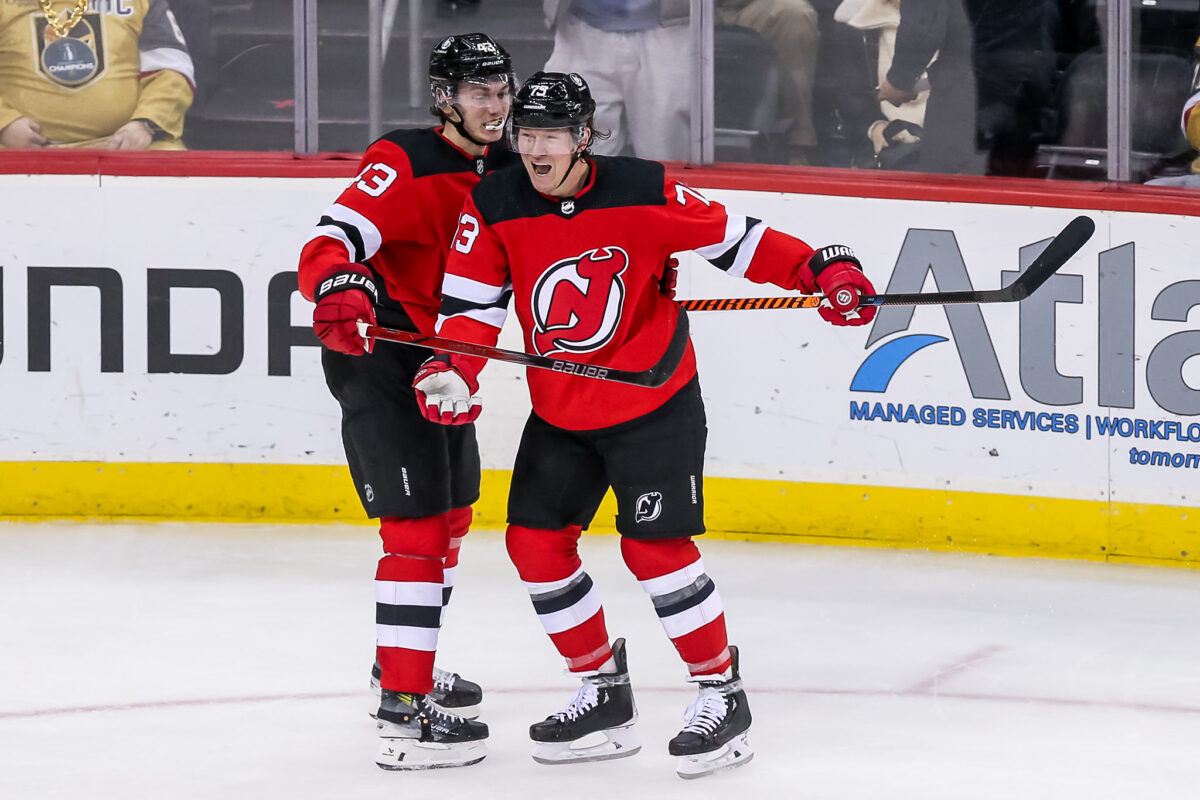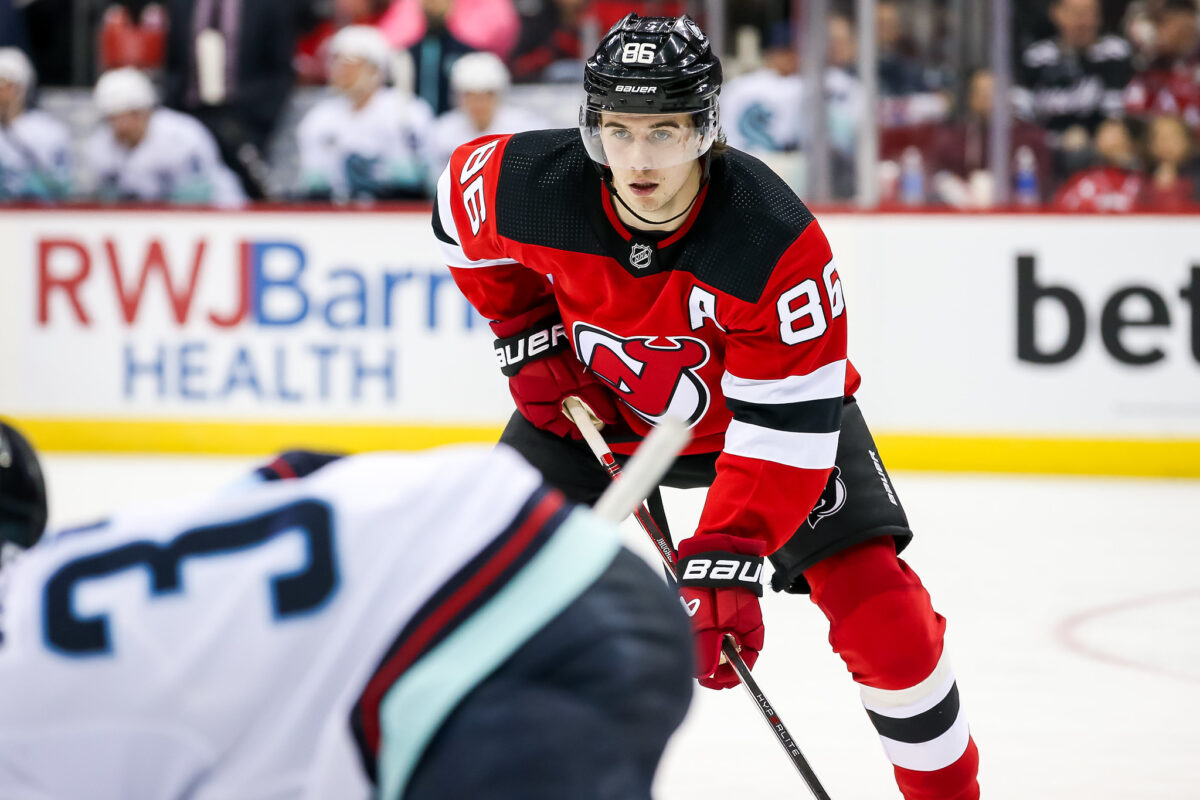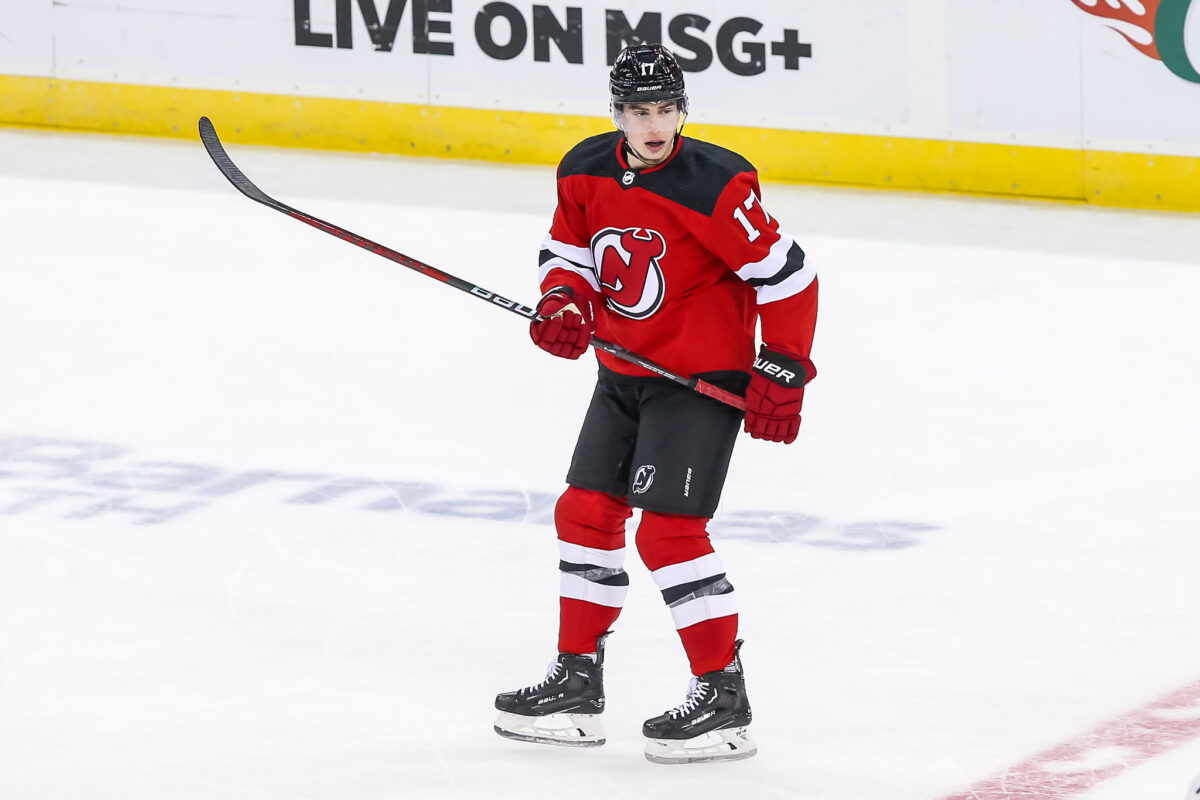The New Jersey Devils entered Thursday night’s contest against the first-place New York Rangers reeling after losing two of three and falling further out of a playoff position. The game began with the Devils earning a five-minute power play, resulting in several perimeter shots on goal but little danger. The Rangers countered quickly with a power-play goal in five seconds, and the Devils never recovered.
Devils’ Power Outage
The Rangers were called for a major, a double minor, and three separate minor penalties throughout the first two periods. Gifted with 11:52 of 5v4 advantage, the Devils mustered 12 shots and zero goals. Their opponents needed only five seconds of power play time to take the 1-0 lead and never looked back.
Related: 4 Trades to Catapult the Devils into the Playoffs
The Devils’ penalty killers mostly did their job. After allowing a fluke goal five seconds into the first power play, they held the vaunted Rangers’ special teams, now ranked sixth in the NHL, to two shots over 6:52 the rest of the game. The team, however, could not take advantage of any of the momentum generated from the kills, largely due to the inability to convert on the power play.
After the game, Nico Hischier expressed frustration with the inability to take advantage of their power-play chances. “(We) gotta score with so many opportunities on the power play. We weren’t sharp enough the first power plays. Later, it was better, but I just couldn’t find the back of the net.” He praised Rangers goalie Igor Shesterkin but felt, in the end, it came down to “execution and that sometimes we need to take more shots. More traffic in front of the net.”

Head coach Lindy Ruff agreed with Hischier, citing execution and giving up slot area shots to shots on the flank. “I thought there were times, especially in our power play, we’re in a great position to shoot and deferred to outside.” The veteran coach cited a play where Luke Hughes passed up a direct shot to pass the puck to Jack Hughes on the outside for a lower-percentage shot.
“Luke was in high danger and passed to his brother, who had a low-danger shot. So, I mean, I’ll reference one play here. I think we did that a couple of times.” He also lamented that, without Dougie Hamilton, he has to rely so much on his rookie defensemen to run the power play, “with no Doug Hamilton, our best choice right now probably is still Luke and Simon on the top, quarterbacking it.”
The Devils led the league in power-play percentage for much of the season’s first month, scoring over a third of the time. They have dropped to 21st in the league at home and 15th overall, now succeeding on less than a quarter of their opportunities. With the Rangers locking down the neutral zone and denying rush opportunities, the Devils needed the power play, and it wasn’t there. “Probably the biggest thing is (our) special teams play. When you look at the game, as a whole, we didn’t spend much time on our end. We cleaned up around the front of our net,” Ruff concluded.
Lack of Finishing Costs Devils Again
A team with eight players already with double-digit goals should not have to worry about scoring, but long droughts, especially at 5v5, have killed the Devils for much of the season. Thursday night was no exception. The team had over 90 shot attempts, registered 40 shots on goal, and only one found the back of the net. Removing the Stadium Series game from the equation, the Devils have only scored four goals in their last three games. The offense has gone stone-cold at the worst possible time.
Early on, the outsized success on the power play covered for the lack of even-strength scoring, but with the power play nosediving, goals have again become scarce. Shesterkin did not give them many openings, saving over three goals above expected, but shot quality and finishing are not new issues. Since returning from the All-Star Break, the Devils are 26th in 5v5 shooting percentage and last in the NHL during that time at all strengths. Half the team’s top-six are shooting under seven percent during that stretch, as are Luke Hughes, Simon Nemec, Alexander Holtz, and Curtis Lazar.
Since his return eight games ago, Jack Hughes has failed to regain his early season form. Ruff acknowledged that Hughes, and virtually everyone else in the NHL this time of year, is playing at less than 100% due to injury. Notwithstanding that fact, Hughes has six points in the eight games since his return and is second on the team with three goals during that span. While he has not looked as dangerous and explosive as he did earlier in the season, he has contributed, but the team needs more from him as they try to climb back into the playoffs.

As trade rumors circulate with the deadline approaching, Dawson Mercer and Holtz are the two most often discussed names. It is unclear if the trade speculation has impacted the young forwards, but each has seen their production plummet since the All-Star Break. In 220 minutes of ice time, the pair has combined for four points, three for Mercer and one for Holtz. While only playing in five games during that stretch, defenseman Brendan Smith has tallied three points in 84 minutes of ice time, many of which came on the penalty kill. Improving offensive efficiency and finding ways to score, which will alleviate pressure on the goaltenders and young defensemen, has to be the team’s top priority.
Rookie Defensemen Playing Like Rookies
The future on the blue line is bright in Newark. Top-four draft picks Hughes and Nemec are overflowing with potential and have tantalized Devils fans with their moments of greatness in their first full NHL seasons. Since Hamilton went down with a torn pectoral muscle at the end of November, the team has relied heavily on the rookies to provide offense from the back end. The results have been mixed. While each has shown extremely bright flashes of offensive skill, they have failed to contribute when the team needed an offensive boost. In 384 minutes since the All-Star Break, the two have combined for three total points. Considering they are the only two defensemen deployed on the power play, that is insufficient production to garner success.
Ruff has said since the summer that he was wary of relying heavily on two rookie blueliners in a season rife with outsized expectations. His fears have been borne out after the organization’s hands were forced following the Hamilton injury. Last season, Hamilton tied a team record for goals by a defenseman and had a knack for getting pucks to the net, especially on the power play. Twice now, after games, Ruff has lamented his rookie defensemen’s inability to effectively run the power play and get pucks through to the net, as well as their decision-making in critical moments.

Team management had to hope that offensive contributions would offset the defensive liabilities that are to be expected from any rookie defenseman. Currently, that just is not happening. Hughes and Nemec both made “rookie mistakes” that directly led to goals for the Rangers. The team is 27th in the NHL in percentage of points from defensemen. While they likely do not need long-term fixes at the position, general manager Tom Fitzgerald has to consider whether a rental upgrade that can contribute offensively is a must if the Devils want to push for meaningful games in April.
After a day off on Friday, the Devils begin a critical back-to-back weekend with games against the Montreal Canadiens and Tampa Bay Lightning on Saturday and Sunday, both in Newark. If the team cannot secure four points, they may quickly become deadline sellers rather than buyers.
